Baby Hedgehog (Hoglet) Care
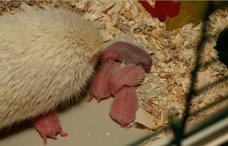
Written by: Dr. Justine Hammond, DVM
Help! My new hedgehog just gave birth unexpectedly!
Lately, Chicago Exotics has received numerous calls and office visits due to unplanned births in recently purchased female hedgehogs. I would like to share some information on what to do in this situation but please realize that this information is not for the purpose of intentionally breeding hedgehogs. If you are interested in starting a breeding operation, I encourage you to contact local breeders, join hedgehog-breeding groups and become active in hedgehog rescue and welfare groups in order to gain a more thorough understanding of hedgehog breeding. If you find that you have a female that has given birth to a litter, I encourage you to call your local exotics veterinarian and join Hedgehog Help Group (Yahoo!) or Hedgehog Welfare Society Group for more information and guidance.
Help! My new hedgehog just gave birth unexpectedly!
Lately, Chicago Exotics has received numerous calls and office visits due to unplanned births in recently purchased female hedgehogs. I would like to share some information on what to do in this situation but please realize that this information is not for the purpose of intentionally breeding hedgehogs. If you are interested in starting a breeding operation, I encourage you to contact local breeders, join hedgehog-breeding groups and become active in hedgehog rescue and welfare groups in order to gain a more thorough understanding of hedgehog breeding. If you find that you have a female that has given birth to a litter, I encourage you to call your local exotics veterinarian and join Hedgehog Help Group (Yahoo!) or Hedgehog Welfare Society Group for more information and guidance.
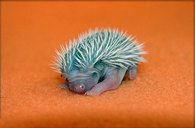
Hedgehog Pregnancy
Females reach sexual maturity at 61-68 days old, however, most first pregnancies occur around 6-8 months old. Be aware, that females can become pregnant anytime after sexual maturity. If a female has been in contact with a male and gains over 50g in the following 3 weeks, she may be pregnant. Pregnant females need extra nutrition during pregnancy and lactation. Supplement them with prescription high calorie cat food or a high quality kitten food during this time. Gestation time (number of days in a hedgehog pregnancy) is between 34-37 days.
Females reach sexual maturity at 61-68 days old, however, most first pregnancies occur around 6-8 months old. Be aware, that females can become pregnant anytime after sexual maturity. If a female has been in contact with a male and gains over 50g in the following 3 weeks, she may be pregnant. Pregnant females need extra nutrition during pregnancy and lactation. Supplement them with prescription high calorie cat food or a high quality kitten food during this time. Gestation time (number of days in a hedgehog pregnancy) is between 34-37 days.
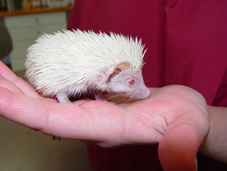
Hedgehog Birth
Females usually give birth at night or early morning. Females are solitary and may injure or kill her young if disturbed. It is important to remove any cagemates and to leave her and her litter undisturbed for at least 5-10 days after birth. If you know your female is pregnant, cagemates should be removed at least 5 days before birth. Mom and babies should be kept in a quiet, secluded spot in your house. Supplemental heat should always be provided to hedgehogs and is especially important for new moms and hoglets (see HH care sheet for more info). Recycled newspaper bedding can be provided for nesting.
The owner should also realize that, unfortunately, females recently purchased and new to the home, may be young and/or under significant psychological stress. Once we add pregnancy to the female’s health demands, mothers may be significantly taxed. Viability of the litter is not always attainable under these circumstances, even with the best of care.
Females usually give birth at night or early morning. Females are solitary and may injure or kill her young if disturbed. It is important to remove any cagemates and to leave her and her litter undisturbed for at least 5-10 days after birth. If you know your female is pregnant, cagemates should be removed at least 5 days before birth. Mom and babies should be kept in a quiet, secluded spot in your house. Supplemental heat should always be provided to hedgehogs and is especially important for new moms and hoglets (see HH care sheet for more info). Recycled newspaper bedding can be provided for nesting.
The owner should also realize that, unfortunately, females recently purchased and new to the home, may be young and/or under significant psychological stress. Once we add pregnancy to the female’s health demands, mothers may be significantly taxed. Viability of the litter is not always attainable under these circumstances, even with the best of care.
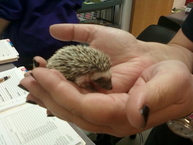
Hedgehog and Her Hoglets
Usually mom gives birth to between 3-5 hoglets but size of litter can range from 1-7. Normally, the hoglets stay in a nest or by mom’s side and nurse frequently. Quietly visually check on mom and hoglets a couple of times daily. Again, hedgehog mothers can become very distressed with handling or noise and may abandon or harm her young. Check to make sure that mom is eating. This may be medical emergency if she stops eating following giving birth. This is because females are prone to complications in the birthing process and our only clue that this is going on may be that she stops eating. Contact your local veterinarian if you are concerned. When looking at the litter also make sure that the babies are in a nest, are unharmed and you may even see or hear suckling. If you see young that are injured, consistently pushed out of the nest and left out or if you are concerned that the young are not nursing, contact your veterinarian. After about 5 days, you may be able to spot clean the enclosure but do not disturb the nest area until about 10 days and if mom seems distressed with you present, stop and try again another day.
Usually mom gives birth to between 3-5 hoglets but size of litter can range from 1-7. Normally, the hoglets stay in a nest or by mom’s side and nurse frequently. Quietly visually check on mom and hoglets a couple of times daily. Again, hedgehog mothers can become very distressed with handling or noise and may abandon or harm her young. Check to make sure that mom is eating. This may be medical emergency if she stops eating following giving birth. This is because females are prone to complications in the birthing process and our only clue that this is going on may be that she stops eating. Contact your local veterinarian if you are concerned. When looking at the litter also make sure that the babies are in a nest, are unharmed and you may even see or hear suckling. If you see young that are injured, consistently pushed out of the nest and left out or if you are concerned that the young are not nursing, contact your veterinarian. After about 5 days, you may be able to spot clean the enclosure but do not disturb the nest area until about 10 days and if mom seems distressed with you present, stop and try again another day.
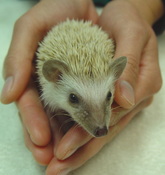
Hoglets should open their eyes around day 13- 24 and mom will start to wean the young at around 4-6 weeks. You can provide them with high quality wet food for cats or with a high- quality dry food for kittens. Hoglets can be removed from mom’s care at 7 weeks. Remember, males need to be separated from females around this time as well.
There are situations that arise in which mothers are unable physically or unwilling to raise litters. If this occurs fostering to a mother with a litter of the same age can be successful. Many breeders and rescue organizations can help you find a foster. Joining Hedgehog Help Group (http://pets.groups.yahoo.com/group/hedgehog_help/) or Hedgehog welfare society’s group (http://pets.groups.yahoo.com/group/hedgehogwelfare/) will lead you to these resources and rescues.
There are situations that arise in which mothers are unable physically or unwilling to raise litters. If this occurs fostering to a mother with a litter of the same age can be successful. Many breeders and rescue organizations can help you find a foster. Joining Hedgehog Help Group (http://pets.groups.yahoo.com/group/hedgehog_help/) or Hedgehog welfare society’s group (http://pets.groups.yahoo.com/group/hedgehogwelfare/) will lead you to these resources and rescues.
Other Resources
Hedgehog Welfare Society http://www.hedgehogwelfare.org/
Chicago Exotics Hedgehog Care Sheet
References
Quesenberry, KE & Carpenter, JW, eds. Rabbits, Ferrets and Rodents, Clinical Medicine and Surgery, 2nd ed. St, Louis, WB Saunders, 2004, pp 343- 344.
Johnson, DH. Common Conditions of African Pygmy Hedgehogs. Western Veterinary Conference. 2004.
Personal communication, Mr. Floyd Aprill, Vice President of the Hedgehog Breeders Alliance and Owner of Milwaukee SuperPogs (http://superpogs.users4.50megs.com/index.htm)
Please contact Chicago Exotics (847) 329- 8709 or your local exotics specialist for more information or if you have any concerns.
Hedgehog Welfare Society http://www.hedgehogwelfare.org/
Chicago Exotics Hedgehog Care Sheet
References
Quesenberry, KE & Carpenter, JW, eds. Rabbits, Ferrets and Rodents, Clinical Medicine and Surgery, 2nd ed. St, Louis, WB Saunders, 2004, pp 343- 344.
Johnson, DH. Common Conditions of African Pygmy Hedgehogs. Western Veterinary Conference. 2004.
Personal communication, Mr. Floyd Aprill, Vice President of the Hedgehog Breeders Alliance and Owner of Milwaukee SuperPogs (http://superpogs.users4.50megs.com/index.htm)
Please contact Chicago Exotics (847) 329- 8709 or your local exotics specialist for more information or if you have any concerns.
